Herbie Hancock is a jazz pianist, keyboardist, and composer who has had a long and illustrious career spanning over six decades. He has released numerous albums as a leader, has collaborated with some of the biggest names in the music industry, and was even part of Miles Davis’ Second Great Quintet (1964–68).
In this post, we will be taking a look at the 10 best Herbie Hancock albums of all time, as a leader. From his early work on Blue Note to his pioneering contributions to jazz fusion and electronic music, these are the albums that showcase the full range of Hancock’s incredible talent and versatility and represent the best of what Herbie Hancock has to offer: incredible jazz music.
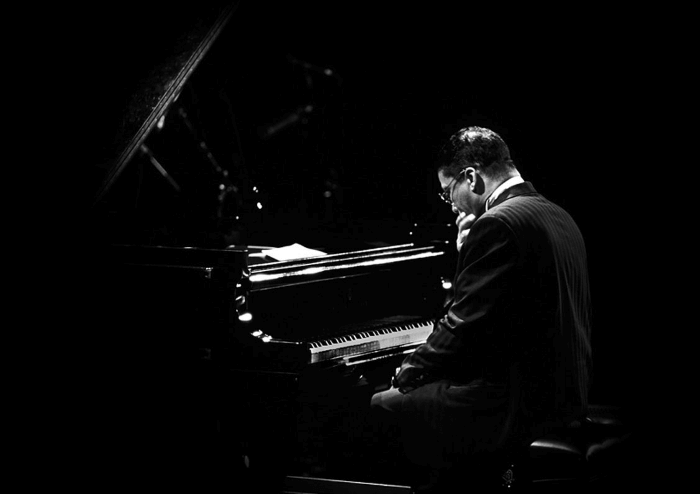
The 10 Best Herbie Hancock Albums
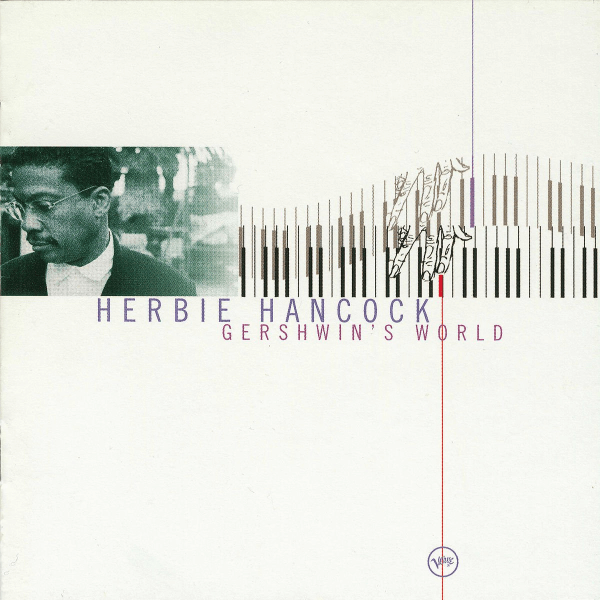
10. Gershwin’s World
(Verve Records)
Gershwin’s World, part of our Best Jazz 1998 selection, is a tribute to the music of George and Ira Gershwin and is an excellent example of Hancock’s talent as a pianist and arranger. It is one of his finest albums and even though it may not have met the commercial success it deserved it won two Grammy Awards: “Best Jazz Instrumental Performance, Individual Or Group”, and “Best Instrumental Arrangement Accompanying Vocal(s)” for “St. Louis Blues” with Stevie Wonder.
Another highlight is the astonishing version of “The Man I Love” by the one and only Joni Mitchell:
“As it turned out, nearly every track is totally different, and yet there’s a thread that binds them all together – that thread is jazz and George Gershwin.”
–Herbie Hancock
Special Guests: Kathleen Battle, James Carter, Chick Corea, Kenny Garrett, Eddie Henderson, Joni Mitchell, Orpheus Chamber Orchestra, Wayne Shorter, Stevie Wonder // See the entire credit list here
Release date October 20, 1998
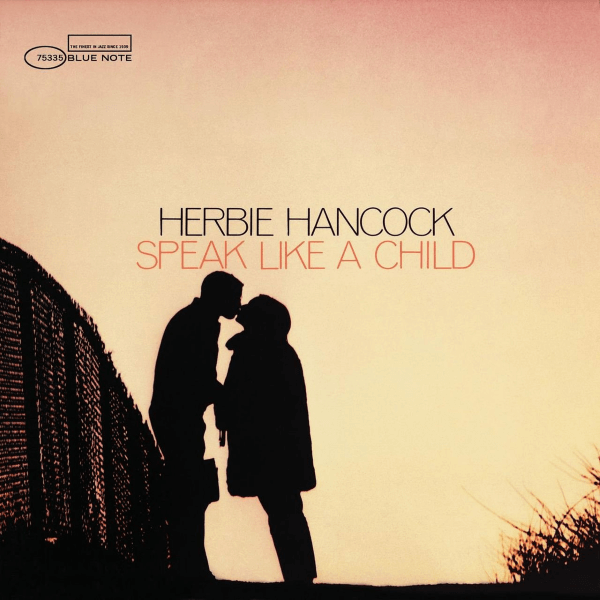
9. Speak Like A Child
(Blue Note Records)
This release, just like Mayden Voyage, is a beautiful classic laid-back jazz album, but this time, as he described hereunder, Herbie Hancock created music somehow easier to apprehend and memorize, kind of a transition to his future steps towards rock music.
“Speak Like A Child, as a title, came from Frank Wolff, and it’s a result of a picture that a friend of mine, David Bythewood, took. I dug it so much I brought it to Frank for use as the cover for this album, Frank said it was so evocative a photograph because of the innocence and naivete in it. And so I started thinking about that quality of innocence while writing this song. Clearly, this music doesn’t sound too much like what’s going on today–war, riots, the stock market getting busted up. And the reason it doesn’t, I realized, is that I’m optimistic. I believe in hope and peace and love. It’s not that I’m blind to what’s going on, but I feel this music is a forward look into what could be a bright future. The philosophy represented in this number, and to a large extent in the album as a whole, is childlike. But not childish. By that I mean there are certain elements of childhood we lose and wish we could have back – purity, and spontaneity. When they do return to us, we’re at our best. So what I’m telling the world is: ‘Speak like a child. Think and feel in terms of hope and the possibilities of making ourselves less impure.’”
–Herbie Hancock, in Liner Notes
Herbie Hancock: piano; Ron Carter: bass; Mickey Roker: drums; Jerry Dodgion: alto flute; Thad Jones: flugelhorn; Peter Phillips: trombone
Release date October, 1968
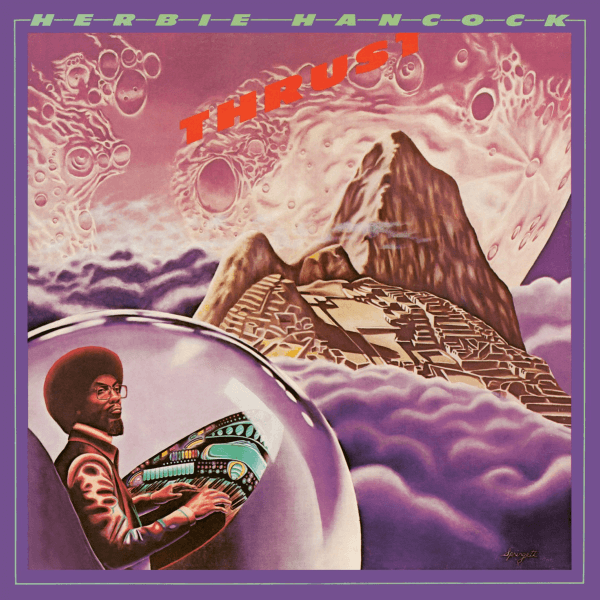
8. Thrust
(Columbia Records)
Thrust is the 14th studio album by Herbie Hancock, released in 1974. It is another classic of the jazz fusion genre–which blends elements of jazz, funk, and rock music. The album features the Headhunters band, including Bennie Maupin, Paul Jackson, Bill Summers, and this time Mike Clark on drums.
The album’s title track, “Thrust,” is a driving and energetic instrumental that showcases Hancock’s keyboard skills and the band’s cohesive playing. Other standout tracks include “Actual Proof,” a funky, upbeat tune that features Hancock’s signature synthesizer sound, and “Butterfly,” a slower, more atmospheric track that showcases the band’s ability to play with different textures and moods.
On why “Actual Proof,” is named so:
“Actual Proof” was to originally be called “The Spook Who Sat By The Door,” from the movie soundtrack. I’m proud of the role I played in helping this classic come to fruition. The producer had asked me to play a rhythm I would have turned my nose up at in the eighth grade. I responded that I wanted us to share the interactions and conversations that were going on inside the groove, in the tradition of Elvin and Trane, or Miles and Tony. At this, the producer became enraged and replied that we had one take, one chance, to do it our way, and if we failed, we had to do it his way. “Actual Proof” is a Buddhist term which signifies, through the act of chanting Nam Myoho Renge Kyo, that one can transform one’s inner life and the environment will respond in kind. I excused myself and sneaked into an empty studio and chanted twenty minutes. It was my determination that we make the first take undeniable, “actual proof,” for all the world to hear. Went back in and we did it. One take. It felt exactly as it sounds. And that’s why Herbie changed the name to “Actual Proof.” Mike Clark, December 1997
Herbie Hancock: Fender Rhodes electric piano, Hohner D6 clavinet, ARP Odyssey, ARP Soloist, ARP 2600, ARP String Ensemble; Bennie Maupin: tenor saxophone, soprano saxophone, saxello, bass clarinet, alto flute; Paul Jackson: electric bass; Mike Clark: drums; Bill Summers: percussion
Release date September 6, 1974
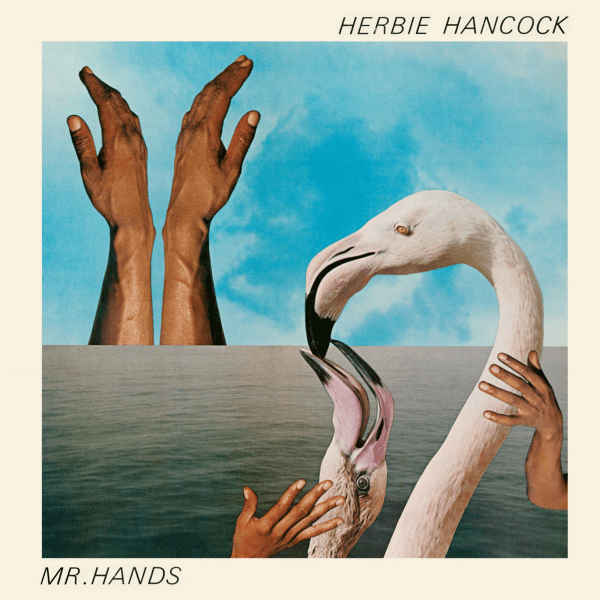
7. Mr. Hands
(Columbia Records)
This album marks Herbie Hancock’s debut with computers to create music (specifically here with an Apple II) but also the end of an area of electric jazz for some time, looking next to R&B influences.
Yet Mr. Hands offers a galaxy of amazing musicians combining again elements of jazz, funk, and electronic music in an accessible and entertaining way, still at the forefront of jazz fusion. Just listen to “Spiraling Prism” if you doubt it:
Herbie Hancock: synthesizer, acoustic piano, electric piano, keyboards, vocals (through vocoder), clavinet, Minimoog, ARP 2600, Apple II, Linn LM-1 drum computer; Bennie Maupin: tenor saxophone; Wah Wah Watson: guitar; Byron Miller, Ron Carter, Freddie Washington, Jaco Pastorius, Paul Jackson: bass; Leon Chancler, Tony Williams, Alphonse Mouzon, Harvey Mason: drums; Bill Summers, Sheila Escovedo: percussion
Release date September 1980
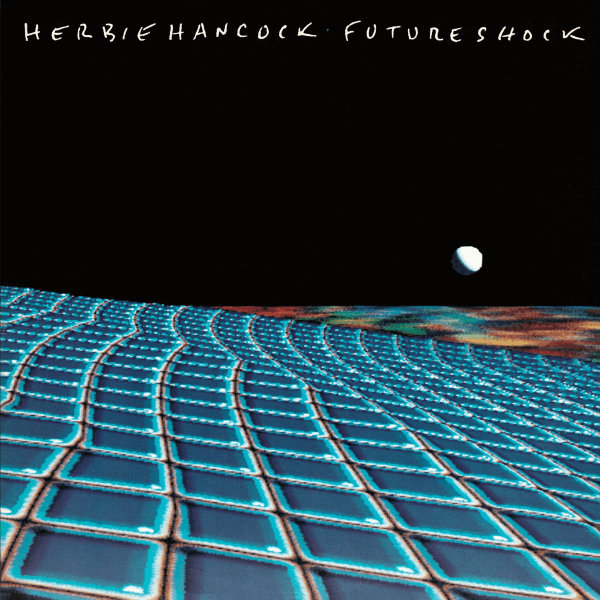
6. Future Shock
(Columbia Records)
Just like the name Future Shock suggests, the album felt like something from the future. It was a completely new and upgraded genre of electro-funk and instrumental hip-hop. This album came as a surprise for his fans, but it got a huge commercial success and opened many doors for the development of music.
“My first Grammy wasn’t even in a jazz category, but of course, I was really excited. ‘Rockit’ was the beginning of kind of a new era for the whole hip-hop movement.”
–Herbie Hancock
Herbie Hancock: piano, synthesizer, Fairlight CMI, keyboards; Bill Laswell: electric bass; D.ST.: turntables, “FX”; Pete Cosey: electric guitar; Michael Beinhorn: keyboards; Daniel Poncé: percussion; Sly Dunbar: drums, percussion; Dwight Jackson Jr.: lead vocals on “Future Shock”; Lamar Wright: lead vocals on “Rough”; Bernard Fowler, D.S.T., Roger Trilling, Nicky Skopelitis: backing vocals
Release date August 1983
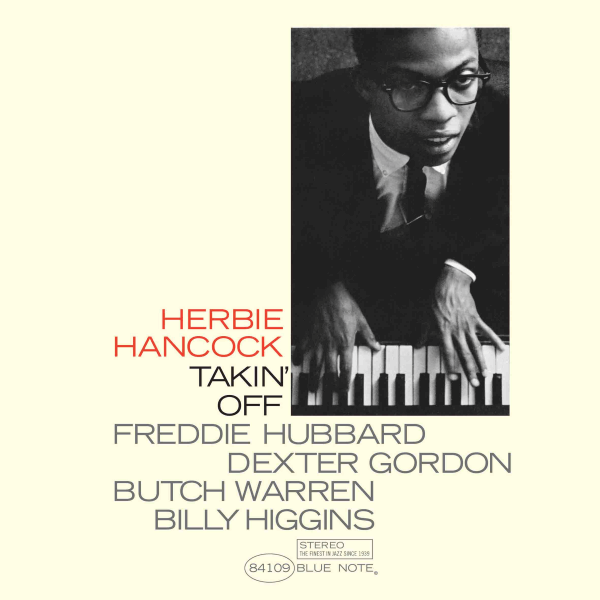
5. Takin’ Off
(Blue Note Records)
Takin’ Off is his debut studio album, released in 1962 on Blue Note, and it is safe to say that it worked as a prophecy: since that day his successes just kept accumulating. It features a mix of soul jazz and hard bop and includes one of Hancock’s most popular and enduring compositions: “Watermelon Man”.
“Back in the day for me was a great time in my life – I was in my 20s. Most people refer to their experiences in their twenties as being a highlight in their life. It’s a period of time where you often develop your own way, your own sound, your own identity, and that happened with me when I was with a great teacher – Miles Davis.”
–Herbie Hancock
Herbie Hancock: piano; Freddie Hubbard: trumpet; Dexter Gordon: tenor saxophone; Butch Warren: double bass; Billy Higgins: drums
Release date 1962
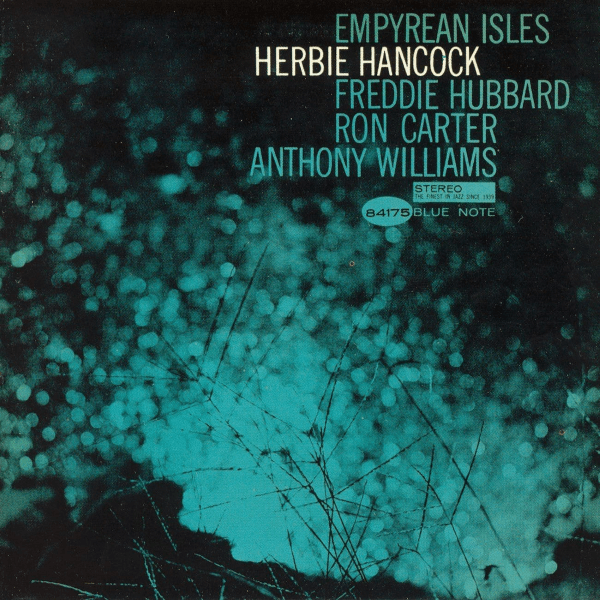
4. Empyrean Isles
(Blue Note Records)
Empyrean Islands is the 4th studio album by Herbie Hancock and it was released in 1964 by Blue Note. It is an experimental album that features a mix of hard bop, post-modal jazz, and soul-injected grooves.
According to Stephen Thomas Erlewine, it definitely established Herbie Hancock as “a major artist in his own right”, and even thou this album is less celebrated than Maiden Voyage, it is still a major accomplishment, radical, and magnificently deploying at the edge of mastery and risk.
Herbie Hancock: piano; Freddie Hubbard: cornet; Ron Carter: bass; Tony Williams: drums
Release date November 1964
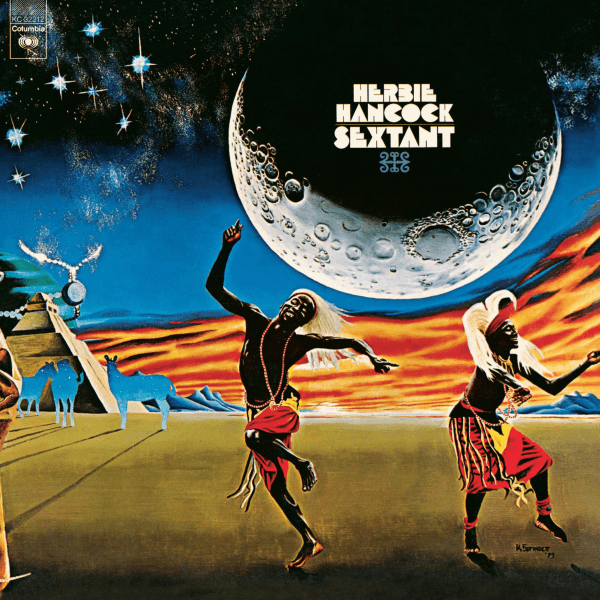
3. Sextant
(Columbia Records)
Sextant is the 11th studio album by Herbie Hancock. Released in 1973, it certainly has been eclipsed by the release, the same year, just a few months after, of Head Hunters. But Sextant should not be overlooked and could remind one of On The Corner by Miles Davis: an amazing album, so very unique, which over the years, manages to find its place in the listeners’ hearts.
1973 marks Herbie Hancock’s debut with Columbia–leaving Warner–but also his moving from New York to Los Angeles, and his conversion to Nichiren Shoshu Buddhism. These 3 major shifts certainly make their way into this spiritual-indigenous-electronic improvised music. A definitive must-have.
Herbie Hancock: piano, Fender Rhodes, clavinet, Mellotron, ARP 2600, ARP Pro Soloist, Moog synthesizer; Bennie Maupin; soprano saxophone, bass clarinet, piccolo, afuche; Eddie Henderson: trumpet, flugelhorn; Julian Priester: bass trombone, tenor trombone, alto trombone, cowbell; Buster Williams: bass guitar, double bass; Billy Hart: drums; Patrick Gleeson: ARP 2600, ARP Pro Soloist; Buck Clarke: percussion
Release date March 30, 1973
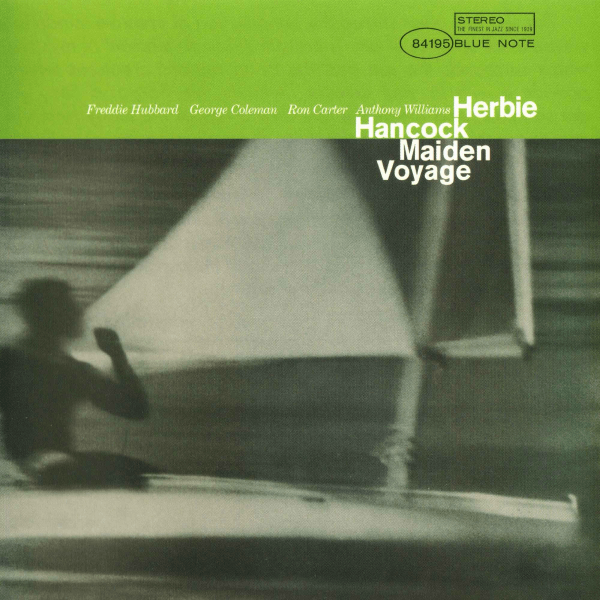
2. Maiden Voyage
(Blue Note Records)
Maiden Voyage is his fifth studio album. It was released in 1965 and it is considered a classic of the post-bop and modal genres. The music is just beautiful, developed as a concept album, aiming at creating an oceanic atmosphere all through the 5 tracks, in substance and form. The result is astonishing.
“Arguably his finest record of the ’60s, reaching a perfect balance between accessible, lyrical jazz and chance-taking hard bop”
–Stephen Thomas, AllMusic
Maiden Voyage was inducted into the GRAMMY Hall Of Fame in 1999.
Herbie Hancock: piano; Freddie Hubbard: trumpet; George Coleman: tenor saxophone; Ron Carter: bass; Tony Williams: drums
Release date 1965
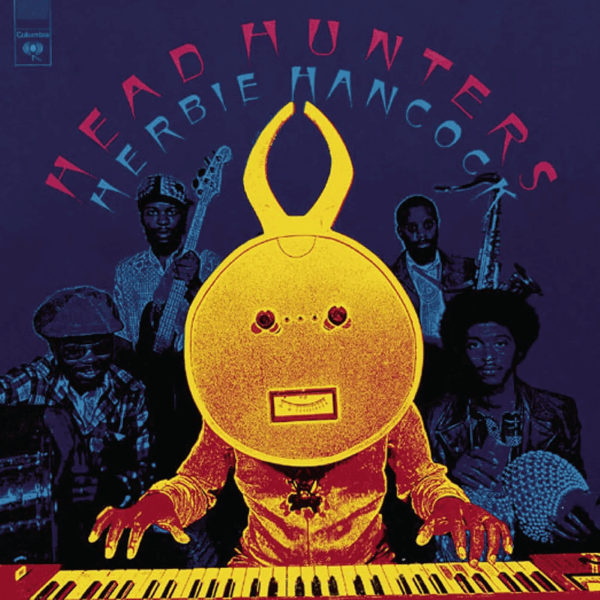
1. Head Hunters
(Columbia Records)
Head Hunters was the breakthrough album for Herbie Hancock, with jazz-rock but also jazz-funk fusion. It created bridges between wilder audiences, enough for this release to become the first jazz album to sell over a million copies.
Visit the Head Hunter post to discover details of the entire album.
Herbie Hancock: Fender Rhodes, clavinet, ARP Odyssey synthesizer, ARP Soloist; Bennie Maupin: tenor saxophone, soprano saxophone, saxello, bass clarinet, alto flute; Paul Jackson: bass guitar, marímbula; Harvey Mason: drums; Bill Summers: agogô, balafon, beer bottle, cabasa, congas, gankogui, hindewhu, log drum, shekere, surdo, tambourine.
Release date October 26, 1973
Best Herbie Hancock Albums List
- Gershwin’s World (Verve Records)
- Speak Like A Child (Blue Note Records)
- Thrust (Columbia Records)
- Mr. Hands (Columbia Records)
- Future Shock (Columbia Records)
- Takin’ Off (Blue Note Records)
- Empyrean Isles (Blue Note Records)
- Sextant (Columbia Records)
- Maiden Voyage (Blue Note Records)
- Head Hunters (Columbia Records)
Final Word
Herbie Hancock is a jazz icon whose career spans over six decades and he paved the way for so many styles and influences. His innovative approach to music and his ability to constantly reinvent himself have made him one of the most respected and influential figures in the world of jazz and this is why Herbie Hancock was honored with The Recording Academy Lifetime Achievement Award in 2016.
The 10 best Herbie Hancock albums listed in this post are here to demonstrate the depth and range of his talent.
